Roberto Carlos
Born in Espírito Santo, on 1941, Roberto Carlos always had interest in music. When he was 12 years old, he moved to Niterói with his family and made some friends who were also interested in music, especially rock'n'roll.
In 1957, he formed with some friends, including Tim Maia, the band "Os Sputniks". In the next year he became a member of "The Snakes" with Erasmo Carlos. They recorded some compacts in the end of the 50s and in 1961 they had their first LP "Crazy for you".
In 1965, with Erasmo and Wanderléa, a program called “Jovem Guarda” on Record TV channel would name the movement which influenced that generation.
He was also the star of some movies inspired on The Beatles in the 60s. The first one was "Roberto Carlos em ritmo de aventura", in 1967, followed by "Roberto Carlos e o diamante cor-de-rosa" and "Roberto Carlos a 300Km por hora". In the 70s with the end of the Jovem Guarda movement, he changes his style and becomes a romantic singer and composer.
Since 1961 he has been making Cds every year, but in 1999 he had to interrupt his career because his wife had a mortal disease (cancer). Since then, his Cds have been launched in Christmas´ time.
TROPICALISMO
The 60´s was the time of those famous MPB Festivals made by TV Record channel. Some young artists that had a new verbal and musical language started to show they work. Those youngs artists were Caetano Veloso, Gilberto Gil, Os Mutantes and Tom Zé.
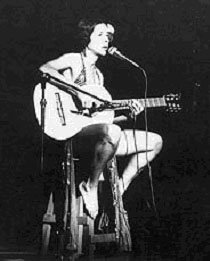
The “Tropicalismo” was the last important Cultural movement in Brazil in the end of the 20th century. It started in 1967 with an MBP Festival Record, and the artists that joined the Festival were Caetano Veloso and Gilberto Gil with the songs: “Domingo no parque” and “Alegria, Alegria”.
The “tropicalistas” had antropofagic ideas of Oswald De Andrade, trying to have a music that mixed a bit of Beatles and Bossa Nova.
Caetano Veloso and Brazilian Popular Music
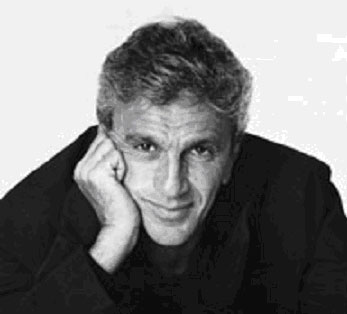
Caetano Veloso was born in August 7, 1942, in Santo Amaro, Bahia countryside.
He is not only one of the most important Brazilian singers, songwriters and acoustic guitar players, but he is also such a style creator.
Caetano Veloso was one of the “Tropicalia” movement creators, in the early 70’s. During the “Tropicalismo” he had many ambitions and interests in different fields. His idea was to modify the panorama of Brazilian Popular Music in order to bring a new critical vision inside the production of the music.
In 1997 Caetano released his book called “Verdade Tropical” (Tropical Truth) in which he explains “Tropicalia” and the key moments of his life. Right after this he released an album called “Book”.
Caetano Veloso wrote many successful songs like: ‘Alegria, Alegria’, ‘Você é Linda’, ‘Eu sei que vou te amar’; and many others.
Until today Caetano Veloso is a very popular and successful singer and very important to Brazilian Popular Music.
CAZUZA: Poet of a generation
“Cazuza “is a Brazilian word that means scamp. This was why João Araújo started calling his son Cazuza even before he was born. Christened as Agenor Miranda de Araújo Neto, the boy always preferred the nickname, until he found out that Cartola, one of his favourite songwriters, was called Agenor, too.
Cazuza was a quiet and well-behaved child, but he became a rebellious teenager. He started to experience sex, drugs and rock’n’roll, was sometimes arrested , and admitted he was bisexual.
After abandoning college, he started working at the artistic department of his father’s company, Som Livre, as press agent . But that wasn’t what he wanted. It was an acting class that showed him what he really wanted to do: sing. Roberto Frejat, guitar-player; Dé, bass-player; Maurício Barros, keyboards; Guto Goffi, drums; Cazuza, singer. This was the formation of Barão Vermelho, Cazuza’s band. They soon became famous with their rock’n’roll, full of slang, that spoke shamelessly, openly of love, pleasure and pain.
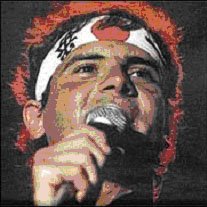
In July of 1985, Cazuza started his solo career. Some months later, he was on the newspapers again. He had been hospitalized in Rio with a 42 ° C fever. Diagnosis: bacterial infection. The result of the HIV test he insisted on taking was negative. But in those days exams weren’t very precise.
After releasing two albums, He discovered he actually had the HIV, and became the first famous Brazilian person who admitted publicly being HIV- positive. In October 1989, after a four-month alternative treatment in São Paulo, Cazuza went to Boston, where he was hospitalized until March of the following year. His health was already extremely delicate and at that stage there was not much that could be done. Thus he died, a little later - on the 7th of July, 1990. The funeral was at the São João Batista cemetery, in Rio de Janeiro. His grave is found close to other stars of Brazilian music like Carmen Miranda, Ary Barroso, Francisco Alves and Clara Nunes.
He was justifiably called the poet of his generation.
Legião Urbana
That band is one of the most successful rock bands in Brazil’s music history. It was created in 1983 and they played until 1996, with the death of its vocalist, Renato Russo.
In Brasília, the band was initially formed by Renato Russo, Marcelo Bonfá (drums), Eduardo Paraná (guitars) and Paulo Paulista (keyboards), but Paraná and Paulista quickly left. Dado-Villa Lobos was replaced by Paraná. In the beginning of 1985, Renato Rocha joined the group as a bass guitarist and they soon recorded their first album, with the hits “Será”, “Ainda é cedo” and “Geração Coca-Cola”.
The second album “Dois” with its powerful lyrics and striking melodies turned the band into a great success especially among teenagers.
After that they recorded many albums like: “Que país é esse?” (1987), “As quatro estações” (1988), “V” (1991), “O descobrimento do Brasil” (1993), “A tempestade” ou “O livro dos dias” (1996), “Uma outra estação” (1997), “Mais do mesmo” (1998) and the TV show “Acústico MTV” (1999).
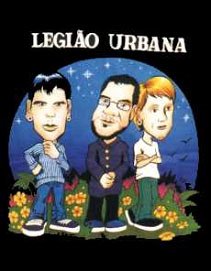
In November 1995 the band performed its last concert. In December Renato Russo released his second solo album “Equilíbrio distante”, sung in Italian. In following year the band released its last album: “A tempestade”, but with a sad tone, directly connected to Renato’s health .
He died a month later from a still unknown AIDS related illness and they separated.
Despite Russo´s death and the group’s disbanding, Legião Urbana continues to be the third best-selling artist, with approximately 350,000 albums sold per year as of 2003. With more than 13 million records sold, the band continues to be very well-known among young Brazilians. Legião Urbana was, and remains, loved because of the songs whose words talk about love, spiritualism, politics, family, sex and drugs. The raw reality of these issues struck a chord with many, including Russo himself.
Mamonas Assassinas
The group was formed in 1993 by five youngsters, who were happy, humble, extrovert and extremely creative. They invented a new kind of music that portrayed, criticized and mocked by the society in an amusing way dancing and performing on stage. Their music made you feel happy. When they were really achieving success, going to TV shows and selling 50.000 CD’s per day, there was a fatal accident in which all of them died. From that moment on we have missed them so much! The lyrics of “Robocop gay” will be always remembered by their fans.
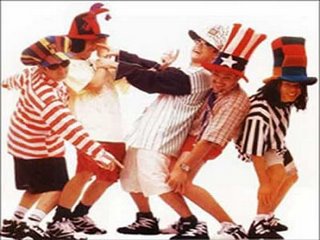
“É uma Partida de Futebol” on stage
Thirteen years of success
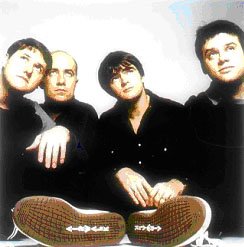
Skank has been one of the most well succeeded Brazilian bands since the 80’s. Its lead singer, guitar player and also songwriter is Samuel Rosa; the drum player Haroldo Ferreti; bass player and second voice Lelo Zaneti, and keyboard player Henrique Portugual.
These four guys gathered at their homeland Belo Horizonte, Minas Gerais where they still live. The band wanted to transfer the Jamaican dance hall atmosphere to Brazilian tradition. Its main influence is reggae and their music became very popular in parties and dance clubs.
Their first record “Skank” was an independent album. The band reached success with its second record named “Calango” and many hits like “Pacato Cidadão”, “Te Ver” and “Jackie Tequila”. But their most famous song is probably "É uma Partida de Futebol" from their album “O Samba Poconé”, a song about the excitement of a soccer match, which is the most popular sport in Brazil.
Skank has already traveled around the world and its record “Cosmotron” won the “Best Brazilian rock album” Latin Grammy of 2003. The band has also achieved success with their last album “Radiola”, from 2004. There is a total of eight records and thirteen years of glory.
Los Hermanos
They are a band that makes art because their music has significant lyrics and the melodies are pleasant to listen to.
Their first successful hit was” Anna Julia” also their first album. Three CD’s have been released so far: “Bloco do eu Sozinho, “Ventura” and “4”.
They are really musicians, who invent chords and are very creative. They have a different, more relaxed style, which can be noticed in their looks with long beards. These people are Marcelo Camelo, Rodrigo Amarante and Barba.
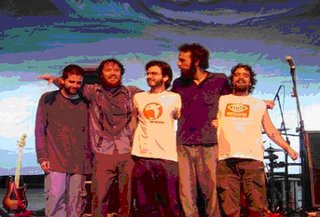
Their music is classified as alternative because they play from parsley to punk.
Project from
Felipe Nunes , Felipe Rubino, Guilherme Visconti,
Renato Corvelo, Mariana Szocs, Isabel Rodrigues,
Daniela Vaz, Julia de Castro , Paula and Vitoria Olivato.
Higher 3
Teacher Virgínia
Centro Britânico
Pompéia Branch

2 Comments:
[url=http://hairtyson.com]Phen375[/url] are tablets that supporter reduce body weight. The same of these tabs has to be taken with drinking-water, almost 20 minutes ahead a meal, twice a day.
[url=http://garciniacambogiaselectz.weebly.com]
cambogia garcinia[/url] is the superior fat blazing extract available in vend for the nonce a days. Let slip upto 10 kg in 1 month. garcinia cambogia select
Post a Comment
<< Home